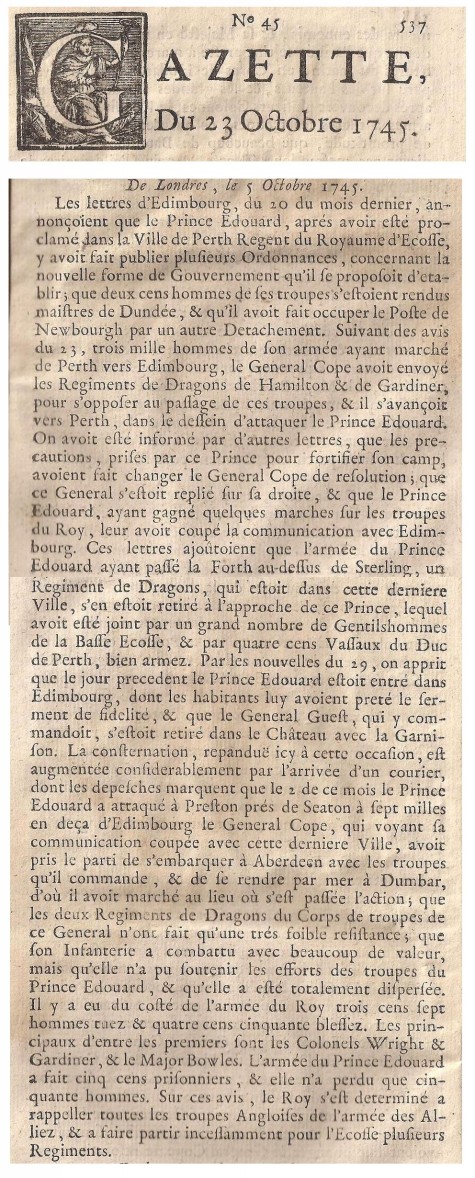The Paris Gazette ..... reporting October 23rd 1745
... on even date with the Treaty of Fontainbleau between France and Scotland, the Paris Gazette carries the first news of Prince Charles' campaign successes, and the good news for Paris that the Elector [King George II] was withdrawing all British troops from the allied army fighting Louis XV's France.

THE GAZETTE, Paris, 23 Octobre 1745
[translation by Arran Johnston]
News from London: 5th October 1745. Letters arriving from Edinburgh, on the 20th of September, announced that Prince Edward[1], having been proclaimed Regent of the Kingdom of Scotland in the town of Perth, had published a number of edicts concerning the new form of government which he proposed to establish; also two hundred men from his forces had taken Dundee, and he had also occupied the port of Newburgh with another detachment.
News arriving on the 23rd : Three thousand men of Prince Edward’s army had marched from Perth to Edinburgh, whilst General Cope had sent the dragoon regiments of Hamilton and Gardiner to oppose the passage of those troops, with himself marching towards Perth with the design of attacking Prince Edward. On his arrival, Cope was informed by certain letters of the precautions the Prince had taken to fortify his camp, which caused him to alter his resolution; so the General continued forward, and accordingly Prince Edward, having gained a march on the troops of the King[2], moved to cut communications with Edinburgh. Letters inform that the army of Prince Edward then crossed the Forth under Stirling, whilst the regiment of dragoons which was stationed in this town retired at his approach[3], allowing him to be joined by a large number of gentlemen from lowland Scotland, as well as by four hundred well armed vassals of the Duke of Perth[4]. On the 29th: on the day before Prince Edward entered Edinburgh, the inhabitants made a show of their loyalty, and General Guest, the commander, withdrew into the Castle with the garrison.
The consternation[5] caused by these events, was increased considerably by the arrival of a courier with dispatches marked the 2nd of this month, announcing that Prince Edward had attacked General Cope at Preston, close to Seton, seven miles outside of Edinburgh. Cope, when his communications with the city had been cut, had embarked at Aberdeen with the forces under his command, and had crossed by sea to Dunbar, from where he had marched to the site of the action. At the battle, the General’s two regiments of dragoons put up but a feeble resistance, and whilst the infantry fought with a great deal of valour they could not withstand the efforts of Prince Edward’s men, and they were routed completely. The action has cost the army of the King three hundred and seven men killed and four hundred and fifty wounded. The foremost amongst the former number were Colonels Wright and Gardiner, and Major Bowles. The army of Prince Edward has taken five hundred prisoners, at a loss to his own forces of but fifty men. As a result of all this, the King has determined to recall all the English troops from the Allied Army[6], and has immediately dispatched several regiments to Scotland.
_________________________________________________________________
[1] The French generally referred to Prince Charles Edward Stuart as le Prince Edouard.
[2] Le Roy, meaning George II, King of Great Britain and Ireland.
[3] Gardiner’s Dragoons, who failed to oppose the crossing at Frew and observe the Jacobites’ movements.
[4] Most of these had joined prior to the crossing, whilst the army had paused at Perth.
[5] Consternation in London. All the news being reported comes from letters arriving in London.
[6] The key French priority: a Jacobite diversion to withdraw British troops from the Continental theatre.
Published Date: April 13th 2010
|





